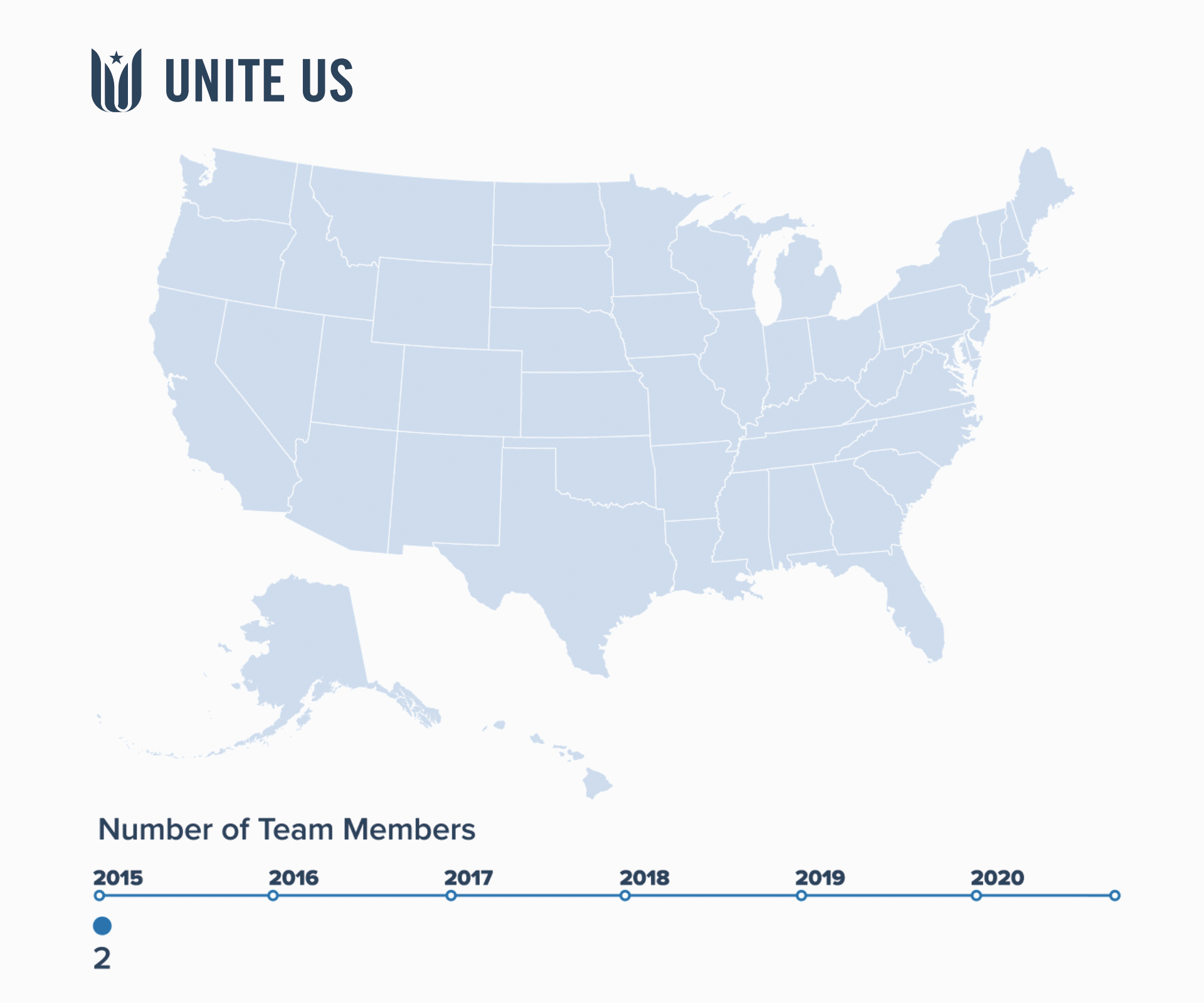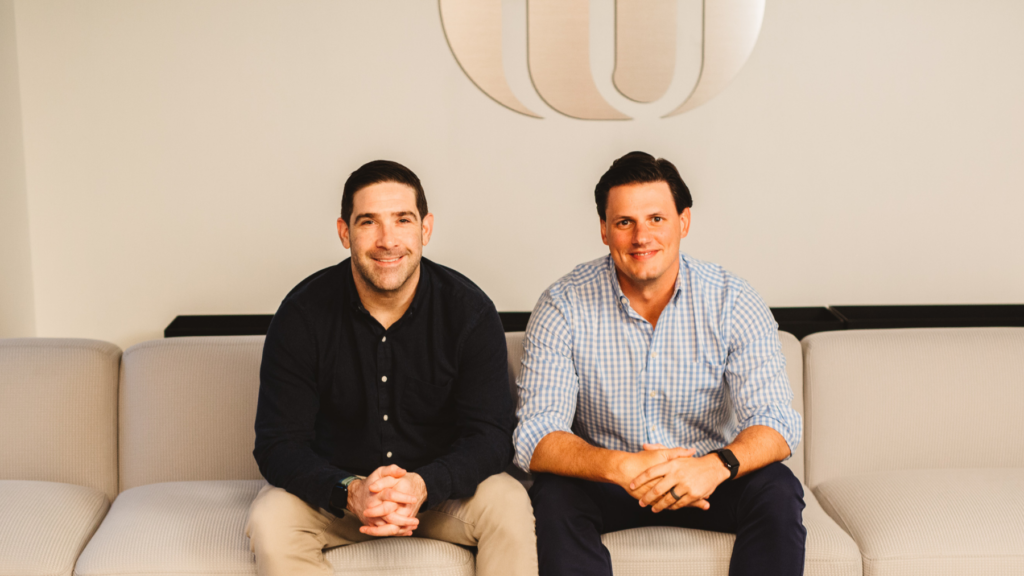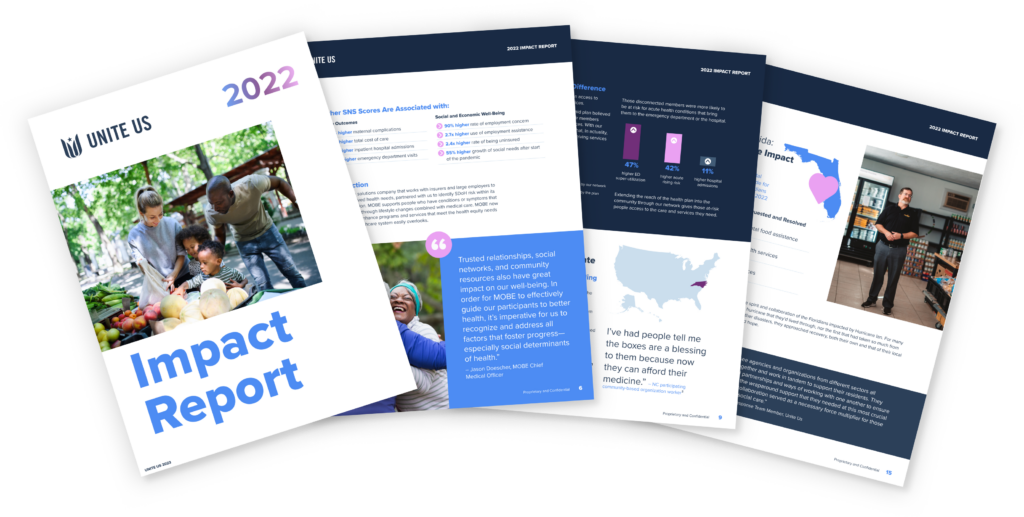
Reflections on 2020
During one of our most challenging times, we’re humbled by our partners’ resilience and their work on behalf of all people.
We’ve collectively learned a lot about ourselves in 2020. In the face of tremendous loss, fear, and exhaustion, we discovered tenacity, compassion, and strength. At Unite Us, 2020 challenged us to meet adversity with a renewed commitment to our mission to help people who are struggling the most right now.
And through it all, we’ve had the great privilege to work in partnership with those of you on the frontlines serving people every single day. The COVID-19 pandemic exposed decades-long health disparities that we suspected were there all along, offering us an opportunity to affect systemic and lasting change in health and social care.
Our plans at the onset of the year may have looked slightly different, but our purpose was clear and we rose to the challenge. We’ve expanded our coordinated care networks in over 42 states, growing our team to more than 300 good humans from New York to Louisiana and everywhere in between, including Hawaii! Together, our team and partners rapidly responded to the growing needs of people impacted by the pandemic. With each new partner and community that joins us, we’re proving that our solution is the foundation for sustainable and equitable public health infrastructure that will eliminate barriers and ensure that everybody has the chance to live a healthy, promising life.
In 2020,
We hit accelerate. |
We were ready to respond. |
We prioritized health equity. |
We stuck to our mission and kept it simple. |
We hit accelerate.
For almost eight years, we’ve been busy building the public health infrastructure to meet this very moment. When the pandemic hit, our team and nationwide partners immediately pivoted to do what we do best – help people who need it most. Here’s what acceleration looks like at Unite Us: Standing up eight COVID-19 rapid response networks, network expansion into over 41 states and the District of Columbia, growing our team to over 300 members, and pioneering 23 game-changing partnerships across entire states and regions.
Community by community, state by state, Unite Us remains unflinching in our resolve to deliver on our mission:
- We expanded to all 100 counties with the nation’s first statewide coordinated social care network, six months ahead of schedule.
- We partnered with national leaders including, CyncHealth, Lyft, Metro Health and others, while deepening alignment and collaboration in Louisiana, Virginia, and Oregon.
- We rolled out the nation’s first seven-state partnership with NEHII (now CyncHealth).
- We tripled the size of our team, adding experts from the very communities we serve.
- We acquired Staple Health, boosting our data analytics capabilities and setting social care data standards.

We were ready to respond.
The pandemic made clear what we’ve known all along: we need reliable public health infrastructure to ensure people get the care they need, when they need it most. Working together with our partners across our unifying platform, we kept people in their homes, coordinated critical supplies to isolated COVID-19 patients, supported individuals and families with the food and economic help they desperately needed, and aided state and local government with rapid COVID-19 response strategies.
Coordinated care networks, structured outcomes, and national social care data are critical to assisting the rising numbers of Americans impacted by the pandemic, putting our state and local governments on the road to recovery, and ultimately, building resilient, healthy, and equitable communities. The network data tell us we are only as powerful as our partners’ participation, and together, we are transforming a broken system into one that works for people.
At Unite Us, we know every data point is a person, and we use that knowledge to drive our decisions to improve lives and build healthier communities.
- We’re leading the national conversation on COVID-19 response and social needs at a time when service episodes have increased 937% since 2019.
- Our networks are driving outcomes (utility payment assistance, food access, transportation, etc.) with a 93% reduction in average time to referral acceptance across all service types since 2014.
- State and local governments look to Unite Us to efficiently distribute critical CARES Act funding and track the impact of those funds.
- Partners use the network data to drill down to race and gender disparities within their communities to identify and address critical gaps in service.
We prioritized health equity.
The COVID-19 pandemic has exacerbated existing health equity challenges across the country, and brought into clear focus the inequities between races and historically marginalized populations. The network data tell a similar story and have made clear our purpose and the impact we can have on advancing health equity across the nation.
We acknowledge our responsibility to step up and do the hard work, both within our company and in communities. We’re applying our tenacity, innovation, and willingness to take risks to build an authentically inclusive, diverse, and equitable culture–now with renewed energy to do even better.
- We’re moving upstream, supporting the health of the communities in which we work, investing in health equity.
- We’re listening to our communities’ voices and creating seats at the table, both with our growing on-the-ground community engagement teams and through our Network Advisory Workgroups.
- We’re using data meaningfully to inform the development and implementation of a health equity strategy that guides all aspects of our work, with the ultimate goal of reducing health disparities in the communities we serve.
- We’re advancing the national conversation on the role of state strategies to create health equity.
- We’re continually ensuring that the accountability and growth resulting from intentional and ongoing Diversity, Equity, and Inclusion initiatives are reflected in our community impact, as we strive to be an example to our partners in this work.
We stuck to our mission and kept it simple; we’re still people helping people.
If nothing else, 2020 illustrated that health and social services must be connected and tracked to ensure delivery. The endless headlines of job loss, eviction, food insecurity, social isolation, and excessive stress have been all too real for many Americans. Far too many faced quarantine and isolation away from critical services, or worse, having to say goodbye to a loved one from a distance. At Unite Us, our goal remains clear and simple: partner with communities to deliver a person-centered care coordination platform and a hands-on community engagement process to ensure services are seamlessly delivered to the people who need them most.
Our solution solves a complex problem, easing the burden on providers and the people they serve.
- We ask the hard questions. What if we all could thrive?
- Behind the technology is our passionate team who wrote 131,999 lines of JavaScript, 65,009 lines of Go, and 50,087 lines of Ruby, and 15967 lines of Python.
- Our community engagement team grew by 113 new team members, seamlessly pivoted to all virtual strategies, and expanded our networks into 197 new counties.
- We help leaders such as the VP of Community Health and Engagement at Christiana Care, Delaware’s largest healthcare system,make criticaland strategic community benefit decisionsby understanding theoutcomesof her providers’ referrals.
 |
 |
 |
2020 didn’t change our mission. It reinforced it.
We hear the call now more than ever to push for change, challenge the status quo, and break down silos that stand in the way of people receiving the care they need. No excuses. This is hard work, but if it’s not hard, it’s not worth it. We hope you’ll join us.
About Unite Us
Unite Us is the nation’s leading software company bringing sectors together to improve the health and well-being of communities. We drive the collaboration to predict, deliver, and pay for services that impact whole-person health. Through Unite Us’ national network and software, community-based organizations, government agencies, and healthcare organizations are all connected to better collaborate to meet the needs of the individuals in their communities.



